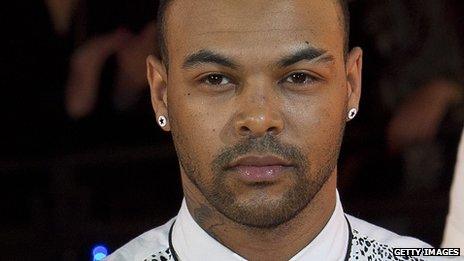Big Brother in breach of Ofcom rules
- Published

Daley Ojuederie was seen with his hand around fellow contestant Hazel O'Sullivan's throat
Channel 5 has been found in breach of Ofcom rules following an altercation between two housemates on last summer's Big Brother.
Boxer Daley Ojuederie was removed from the house in July over threatening and aggressive behaviour towards model Hazel O'Sullivan.
Some 165 viewers complained to the regulator, saying they were offended by Ojuederie's actions.
Ofcom said airing the incident unedited was not justified by the context.
It added the absence of a sufficient warning ahead of the broadcast along with a lack of clarity on Daley's conduct during the show, led it to its decision that Channel 5 broke generally accepted standards.
In the episode, broadcast on 15 July, Ojuederie and O'Sullivan were shown alone in the Luxury House laughing and joking before a pillow fight ensued.
During the fight, O'Sullivan took Ojuederie's duvet and later pulled down his shorts. Appearing upset over the incident, the boxer was seen on top of the model, saying he would "finish" her and pinning her down to her bed by her throat.
'Aggressive behaviour'
In an expletive-filled exchange, he threatened to "nut [her] one" before Big Brother intervened and he was called to the diary room.
Viewers saw Ojuederie explain his version of events and Big Brother tell him it did "not tolerate aggressive behaviour or language".
The programme then showed events the following morning where O'Sullivan was given a formal warning for her behaviour during the incident.
Ojuederie was also shown being told by producers that his conduct was "unacceptable" and they could not "permit behaviour which may cause harm and offence". He was then removed from the house.

Hazel O'Sullivan was given a formal warning for her behaviour during the incident
In its response to Ofcom, Channel 5 said Big Brother was well known for dealing with controversial and difficult situations and its audience expected such scenarios.
It argued if the incident had breached generally accepted standards, it would have expected more than 165 complaints from about 1.8 million viewers who watched the incident broadcast at 22:40 BST.
It said Ofcom's code did not prohibit broadcasting material "such as Daley's threatening behaviour towards Hazel", arguing "similar scenes appear in television dramas and films without question or complaint".
The broadcaster said its pre-show advisory about "scenes of a sexual nature and some scenes that some viewers may find distressing" gave sufficient warning to viewers.
It added that, as the housemates' fates were decided by viewer voting, it was "impossible" to ignore the confrontation and it therefore broadcast it in full to allow viewers to see the context, rather than an edited version which "could potentially have resulted in viewers being 'misled'."
'Grave offence'
On the issue of not intervening sooner, Channel 5 said there was no indication O'Sullivan was distressed by the altercation or felt an immediate threat.
It denied Ojuederie's initial warning did not make it sufficiently clear that his behaviour was unacceptable. It added the whole sequence of events through to his eviction were broadcast to mitigate offence and ensure "no person was left wondering what was going on or how any party was feeling".
Ofcom said it recognised viewers expected tensions on the show, but also expected offensive behaviour to be dealt with "in an adequate, timely and proportionate manner".
The regulator said Ojuederie's comments and actions "were clearly capable of causing grave offence", containing "clear descriptions and threats of violence... and his actions compounded these verbal threats".
The watchdog said viewers had different expectations watching dramatised, fictional violence than violence in a reality TV format which reflected real events and would therefore expect the broadcaster to intervene at the earliest opportunity.
Watching the footage, Ofcom said it was reasonable to interpret O'Sullivan was in distress and producers should have taken action sooner.
Ofcom said while it noted Channel 5 took steps to contextualise the incident, it should have edited the footage to limit offence.
It added the lack of a more specific warning nearer to the incident during broadcast led it to conclude the offence to viewers was not justified by the context.